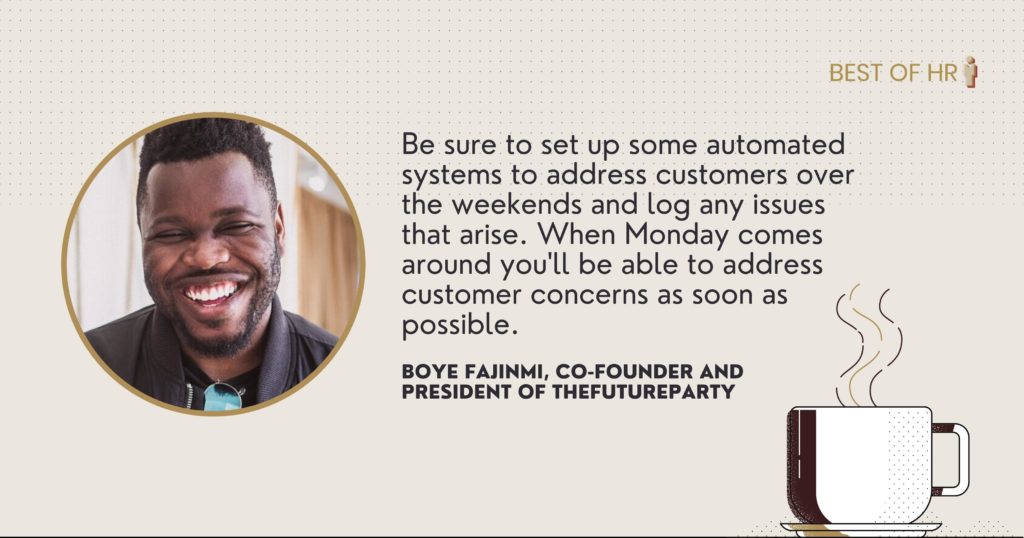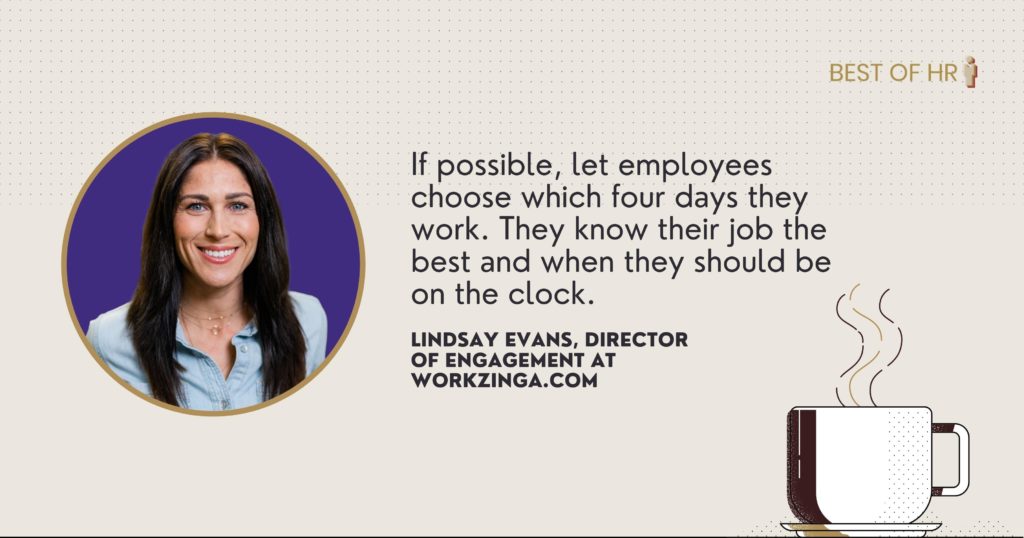What are best practices for a four day work week?
Are you tired of working long hours just to barely make ends meet? If so, you’re not alone. In fact, a growing number of people are choosing a four day work week as the best way to live the life they want. Four day work weeks have been shown to be more productive and efficient than traditional work weeks, and they also allow people to spend more time with their families.
Here are 13 four day work week best practices that will help you get the most out of this unconventional way of living:
- Tune Customer Service
- Include Stagger Start and End Times
- Take Advantage of the Extra Creativity and Energy
- Practice a Sliding Scale Work Week
- Be Clear That One Less Day Equals a Whole Work Week
- Encourage Employees to Make the Most of Extra Days Off
- Notify Customers in Advance
- Determine What Success Looks Like
- Don’t Contact People On Days Off
- Set Expectations with Employees
- Test the Policy Before Full Implementation
- Show that You Trust Your Team
- Create a Risk Mitigation Plan
Tune Customer Service
One less day or work means one less day when customers can contact your business in case of an issue. While four day weeks are starting to catch on a bit more in current times, you shouldn’t expect a disgruntled customer to look fondly on not being able to contact you during what is still essentially a week day. To mitigate the loss of the day, you need to have spot on customer service in place.
Post clearly that your business hours are Monday through Thursday in order to avoid confusion. Be sure to set up some automated systems to address customers over the weekends and log any issues that arise. When Monday comes around you’ll be able to address customer concerns as soon as possible. One less day in the work week will require quality service for customers to cope, be sure to take the necessary steps to keep your customer service running smoothly.
Boye Fajinmi, Co-Founder and President, TheFutureParty

Include Stagger Start and End Times
There is no one “best” practice when it comes to a four day work week, as the approach that works best for one organization may not be ideal for another.
However, some tips to consider when implementing a four day work week include stagger start and end times so that the office is not completely empty on any given day, staggering breaks throughout the day so that workers are not all out of the office at the same time, and ensuring that all essential tasks are completed during the shortened workweek.
Aviad Faruz, CEO, FARUZO New York
Take Advantage of the Extra Creativity and Energy
The biggest advantage of a 4 day work week doesn’t lie in the work, but how you make use of the time you have off. Google famously introduced a work program where the first 2 hours of every employee’s day were to be spent working creatively on a personal project they believed was important. The results gave birth to some of the company’s greatest innovations.
Similarly, the best advantage of a 4 day work week comes in the creativity, relaxation, and improved relationships that manifest from spending more time away from the computer screen.
Ubaldo Perez, CEO, Hush Anesthetic
Practice a Sliding Scale Work Week
Put the focus on Monday. It’s going to be the most high energy and productive day with employees coming off of their weekend. Your biggest tasks of your working week should center around this time when everyone will be that their best. Work down from there, with the last day of the week being the day when the workload peters outs to the simplest or most routine tasks. This will make sure workers aren’t under highs stress and return at their peak.
Max Schwartzapfel, CMO, Schwartzapfel Lawyers
Be Clear That One Less Day Equals a Whole Work Week
When implementing a four-day work week, it’s important to make it very clear that one less business day doesn’t mean less work. Rather, it should be made explicitly clear to your team that the same amount of work and productivity needs to happen in order for your business to continue operating within a four-day work week. Without sounding threatening, of course, you need to establish boundaries for this new work schedule that ensures your continued operational success.
Eric Elggren, Co-Founder, Andar
Encourage Employees to Make the Most of Extra Days Off
When a workforce makes the change to a four-day work week, it’s important for managers to encourage employees to make the most of their extra day off by doing something fun or productive. Pursuing a hobby or taking care of personal errands can help free up time during the work week and make employees feel like they have less to work about whilst at work.
When it comes to running errands, having an extra day off on a weekday allows employees to do things that are either closed or inaccessible on weekends, meaning that they won’t have to rush around on their lunch break to get things done throughout the week! This extra day off also typically provides parents with time to relax whilst their children are at school or daycare, allowing them to come back to work feeling extra refreshed, recharged, and motivated.
Teresha Aird, Chief Marketing Officer and HR Lead, Offices.net
Notify Customers in Advance
If you don’t have an answering service, you’ll need to let your customers know that your business is shifting to a four-day work week. The new schedule results in one less day for administrative tasks like answering phone calls, replying to emails, and fielding customer concerns – therefore, it does shorten the time that clients can get service.
Always notify your customers in advance when making major changes to your employee schedule.
Patricio Paucar, Co-Founder + Chief Customer Officer, Navi
Determine What Success Looks Like
Determine what success looks like in this environment. Is it work-life balance or productivity? For a team to excel, everyone needs to be on the same page. Senior leaderships needs to have open communication with employees and reach a common goal of success. In doing so, team members can find a proper way of working together and succeeding as a team.
Jodi Neuhauser, CEO, Ovaterra
Don’t Contact People On Days Off
Commit to it. If a company wants to implement a four-day work week, it’s important that they respect the additional day off and don’t send work communications. Not every business is realistically able to operate four days a week, but the way around that is to stagger off days throughout departments. This way, you can provide coverage when external business needs arise while still truly allowing people to work four-day weeks.
Vimla Black Gupta, Co-Founder and CEO, Ourself
Set Expectations with Employees
One best practice for a four-day workweek is to set expectations with the employee. Will this workweek consist of 4-8 hour days or 4-10 hour days and will the employee’s pay be impacted? Surveys that I have read suggest that employees are more productive when they work a four-day workweek as they have less downtime in the workplace.
Lindsey Hight, HR Professional, Sporting Smiles
Test the Policy Before Full Implementation
A four-day workweek is not a traditional concept. Prior to the pandemic lockdowns, most offices operated on a five-day schedule. The best practice while planning to adopt a permanent change is first to test it. The test period will help you know the effect of the shift on productivity. It will also help prepare the employees psychologically for the new routine, and indicate areas that need improvement to get the best out of the change. You’ll be able to refine the program based on real-world outcomes and make the best decisions for your company.
Ruadhan O, CEO, Founder, Developer, and Trader, Seasonal Tokens
Show that You Trust Your Team
If possible, let employees choose which four days they work. They know their job the best and when they should be on the clock. Help ensure there is optimal coverage of the department, etc. Here is your chance to show that you trust them and value their input. Give it a trial run, knowing that you can adjust at any time. Progress, not perfection.
Lindsay Evans, Director of Engagement, Workzinga.com

Create a Risk Mitigation Plan
The best practice of four day work week is to set a risk mitigation plan. Four day work week comes with a host of benefits. However, it can also lead to problems and risks in terms of costs, productivity, equality, and more. The best way to manage those is to implement a risk mitigation strategy to prevent some potential challenges and be ready to resolve them.
Sylwia Smietanko, HR Specialist and Recruiter, US Passport Photo
Submit Your Answer
Would you like to submit an alternative answer to the question, “What are some best practices for a four day work week?” Submit your answer here.

